ABSTRACTS 2nd Session October 21st , Friday afternoon
ECOSYSTEMS OF LEARNING. EQUITY, EXCELLENCE AND INCLUSIVENESS IN EDUCATION

| Larry Rosenstock, founder of High Tech High, will deliver his speech together with his wife Jean Kluver, the author of the book Changing the Subject: Twenty Years of Projects from High Tech High |
Larry Rosenstock
After fifty plus years in schools with walls, the title of this meeting “A school with no walls. An ecosystem approach to learning” is a welcome topic!
I could talk to you about school design, scheduling, training teachers, or the
High Tech High design principles that create the DNA for all of our schools.
But you can find all of that on our website.
At this stage in my life, what feels most important to me in creating an ecosystem of learning is people and their relationships to each other, so I want to tell you about some of the people who have influenced me…
MY CARPENTRY STUDENTS
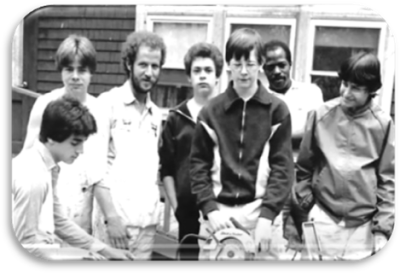 I was working as a carpenter, fixing a community center in a low income neighborhood. After school, kids came over and were interested in learning about what I was doing. This led me to get my vocational teaching license (which is a lot easier than becoming a regular teacher, I might add). Teaching carpentry, and going to law school at nights, I saw how starkly segregated American schools were. The kids of poor families went into vocational education, while the middle class kids were in the college track classes. But my kids were just as bright as the other kids, sometimes even more so! Learning from those students started me on my lifelong efforts to bring together academic and real world learning, and to bring more equity into schools.
I was working as a carpenter, fixing a community center in a low income neighborhood. After school, kids came over and were interested in learning about what I was doing. This led me to get my vocational teaching license (which is a lot easier than becoming a regular teacher, I might add). Teaching carpentry, and going to law school at nights, I saw how starkly segregated American schools were. The kids of poor families went into vocational education, while the middle class kids were in the college track classes. But my kids were just as bright as the other kids, sometimes even more so! Learning from those students started me on my lifelong efforts to bring together academic and real world learning, and to bring more equity into schools.
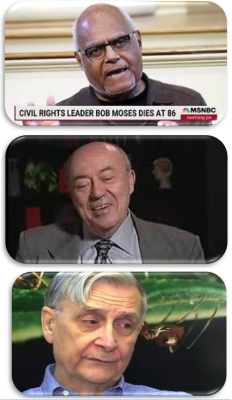 BOB MOSES
BOB MOSES
My high school math teacher who became a civil rights advocate and later created a whole new way to make algebra accessible to everyone.
.
IRWIN JACOBS
A key founder of High Tech High and also the inventor of cell phone technology. As a high school student, Irwin told his counselor he wanted to be an engineer.
Since his father worked in a restaurant, the counselor told him he should go into that business. Why be an engineer anyway, because “everything has already been invented.”
E.O. WILSON
An ever curious mind who used his passion – ants – to understand our whole natural world.
.
And some people who I never met influenced me profoundly as well…
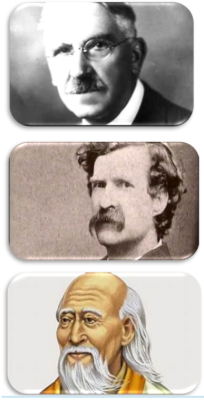 JOHN DEWEY
JOHN DEWEY
“Give the pupils something to do, not something to learn; and when the doing is of such a nature as to demand thinking; learning naturally results.”
.
MARK TWAIN
“I never let my schooling interfere with my education”
.
LAO TSE
“A leader is best when people barely know he exists, when his work is done, his aim fulfilled, they will say: we did this ourselves.”
That is the story of the many people and forces that influenced me in starting up High Tech High, which eventually grew to a network of 16 schools.
.
Here to bring you up to the present is Jean Kluver, my colleague and wife.
Jean Kluver
While Larry was founding HighTech High, I was working in a primary school focused on social emotional learning, inquiry, and child centered learning. When we joined the schools together we realized something — that social emotional learning and project-based learning are really two sides of the same coin.
As you have heard from Larry’s talk — the idea of students doing work that matters (rather than simply taking tests) is central to High Tech High.
So is the idea that the ultimate assessment of student learning is in the quality of the work they produce.
When Larry won the WISE prize, one of his goals was to share the work of HTH students and teachers as widely as possible.
Here today I will give you some examples of that student work — which are excerpts from our book, Changing the Subject: Twenty Years of Projects from High Tech High.
.

If there is one thing the pandemic has taught us, it is that the future will always surprise us. Succeeding in a changing world requires that students and their teachers are able to cope with unforeseeable challenges.
The disruption has yielded many observations, but two are particularly important.
 Firstly, digitalisation has not just helped maintain teaching and learning during school closures but transformed it. Schools are now waking up to a digital world that will fundamentally change learning.
Firstly, digitalisation has not just helped maintain teaching and learning during school closures but transformed it. Schools are now waking up to a digital world that will fundamentally change learning.
Secondly, students, schools and education systems that were not ready for this transition have fallen significantly behind.
Inequities in digital infrastructure and equipment, and people’s digital skills are but one aspect of many education systems’ insufficient inclusivity. The presentation will look at the pedagogical implications of digitalisation and how inclusive education can be the driver of more inclusive communities. Vulnerable students, especially, have suffered socially, emotionally and academically because of the pandemic; they deserve special attention in its aftermath. These students may also experience more fragile social, emotional and physical health in the future.
At a glance, the questions of digitalisation and inclusion may seem distinct from each other. But the thread that ties them together is a vision for education that welcomes all learners, creates communities filled with safety and belonging, guides them to responsibly navigate the physical and digital worlds,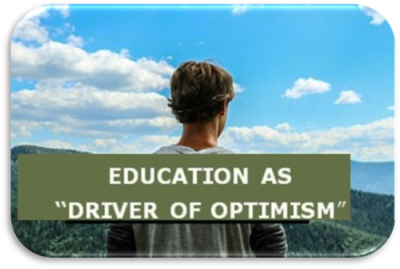 and instills in them a sense of optimism that they can make the world a better place, in spite of the overwhelming challenges of war, anti-democracy, civic unrest, and climate change.
and instills in them a sense of optimism that they can make the world a better place, in spite of the overwhelming challenges of war, anti-democracy, civic unrest, and climate change.
This vision of education as “driver of optimism” is already the reality in some classrooms and schools today. But it is not a universal experience even across education systems—much less the entire world.
.

 People who were born after 2008 are referred to as digitods. They have grown up in a completely different era than past generations. They have been exposed to many forms of technology, including portable devices, such as tablets and smartphones almost from birth. I was born in 2009 and am part of this cohort.
People who were born after 2008 are referred to as digitods. They have grown up in a completely different era than past generations. They have been exposed to many forms of technology, including portable devices, such as tablets and smartphones almost from birth. I was born in 2009 and am part of this cohort.
The purpose of technology is to make it easier to do things, but not at the cost of taking over our lives and doing everything for us. As technology advances, it also decreases important things in our lives. It takes away from community and humanity. At what point is it enough? Where do we draw the line? Why are we trying to advance our technology more and more, at the cost of humanity and community? Humanity is far more important than any artificial intelligence. Humanity is the greatest technology of all time and we should really be focusing on the technology of us.
How can we foster empathy, kindness and humanity in youth who are growing up in this new era? I will be presenting potential solutions throughout my presentation to these questions that I have posed. Moreover, I will be discussing what has personally helped me to keep a good balance throughout my own childhood in this new age.
 I have been involved in community service and youth activism from the age of 5. I have been a Youth Ambassador for many organizations, such as HundrED, United Way, 1Girl, Apar Initiative and Gems for Gems. I have shared my voice and thoughts on incorporating youth mental well being into education systems. I am currently working with the United Way, one of the largest organizations in Canada, who focuses on building stronger, more resilient communities.
I have been involved in community service and youth activism from the age of 5. I have been a Youth Ambassador for many organizations, such as HundrED, United Way, 1Girl, Apar Initiative and Gems for Gems. I have shared my voice and thoughts on incorporating youth mental well being into education systems. I am currently working with the United Way, one of the largest organizations in Canada, who focuses on building stronger, more resilient communities.
As we enter the fourth industrial revolution, it is critical to change and evolve to offer the best outcomes for the future of all students worldwide. I strongly believe in having students learn about positive mindset, coping skills and character development. I also strongly believe that community service and volunteering opportunities should be available through schools.  Being part of a community and giving back teaches valuable lessons that a machine cannot ever do. I also want to share that young people have the power to make a difference at any age, and its crucial that we have supports and mentors to help us.
Being part of a community and giving back teaches valuable lessons that a machine cannot ever do. I also want to share that young people have the power to make a difference at any age, and its crucial that we have supports and mentors to help us.
It is critical that we maintain a balance between AI and humanity. The technology that we’ve always been searching for is right here, within us. Humanity is far too important to lose.
.

Learnlife Barcelona was founded in response to the obvious and urgent need for learning communities that enabled learners to flourish in an ecosystem where people grew their lifelong personal learning capabilities. There have been multiple innovative projects that have sought to break out of the model of traditional schooling, with learning experiences better designed to empower learners to be ready to make a positive impact on the different challenges that surround us. Learnlife seeks to do just that.
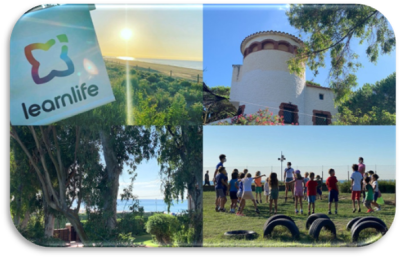 At the heart of the Learnlife framework for learning is an understanding that every child needs to thrive in a community where the daily experience of relationships is positive, nurturing, enabling and consistent. In addition, they need to learn to micro skills of how to become an autonomous learner. Learning needs to draw from all opportunities in their wider ecosystems – never confined to a one teacher, one classroom scenario. It also needs to be authentically real life. Direct daily access to a variety of studio-based ‘maker’ experiences can provide these deep learning opportunities. Studios where learners can grow in their knowledge and passion in any area – whether that be, for instance, in science, the natural world or the expressive arts.
At the heart of the Learnlife framework for learning is an understanding that every child needs to thrive in a community where the daily experience of relationships is positive, nurturing, enabling and consistent. In addition, they need to learn to micro skills of how to become an autonomous learner. Learning needs to draw from all opportunities in their wider ecosystems – never confined to a one teacher, one classroom scenario. It also needs to be authentically real life. Direct daily access to a variety of studio-based ‘maker’ experiences can provide these deep learning opportunities. Studios where learners can grow in their knowledge and passion in any area – whether that be, for instance, in science, the natural world or the expressive arts.
Be inspired to understand how the different elements for transforming the learning opportunities for all students is within reach of any learning community with a clear vision for the future.

 In Italy giftedness has long been a marginal issue in the wider debate on learning processes. The main priorities were universal access to school and an increasing attention to “no one left behind”, which left little space for other topics. In recent years, however, a multidimensional concept of equity has been developing, and the focus on equal opportunities in education has extended to all types of diversity and individual differences.
In Italy giftedness has long been a marginal issue in the wider debate on learning processes. The main priorities were universal access to school and an increasing attention to “no one left behind”, which left little space for other topics. In recent years, however, a multidimensional concept of equity has been developing, and the focus on equal opportunities in education has extended to all types of diversity and individual differences.
From this perspective, the rights of gifted students are now taken into account together with the institutional (and constitutional) duty of supporting students from low socio-economic backgrounds.
Developing the rights of gifted students aims to enhance their potentials not only for their sake but for ours.
In his presentation Paolo Barabanti will try to provide some answers to these questions:
- What does being a gifted student mean and what are his characteristics?
- Through which data is it possible to explore this phenomenon?
- Why should an equitable school pay attention also to gifted students?
- How could giftedness in school be enhanced without the risk of an elitist and selective education?
The answers to these questions can help set a new attitude towards human capital, which is a basic need for the educational system today. A critical reflection on the potential and limits of the current situation aims to facilitate the education of gifted students and enhance any human resource available in schools.



